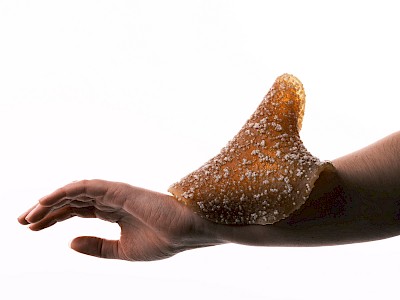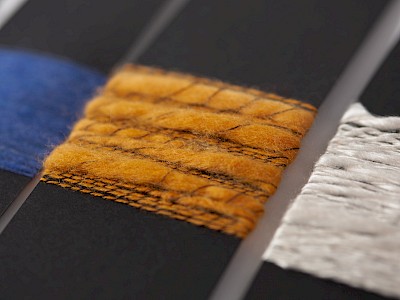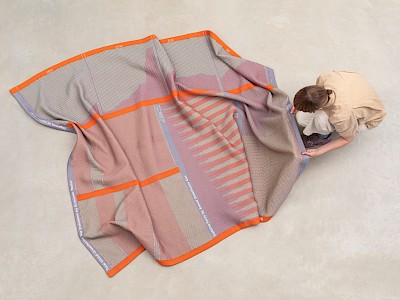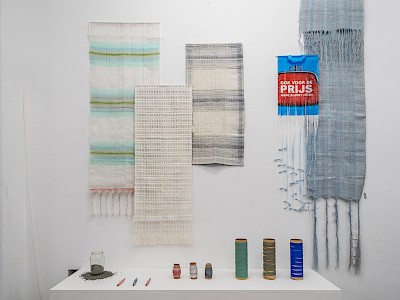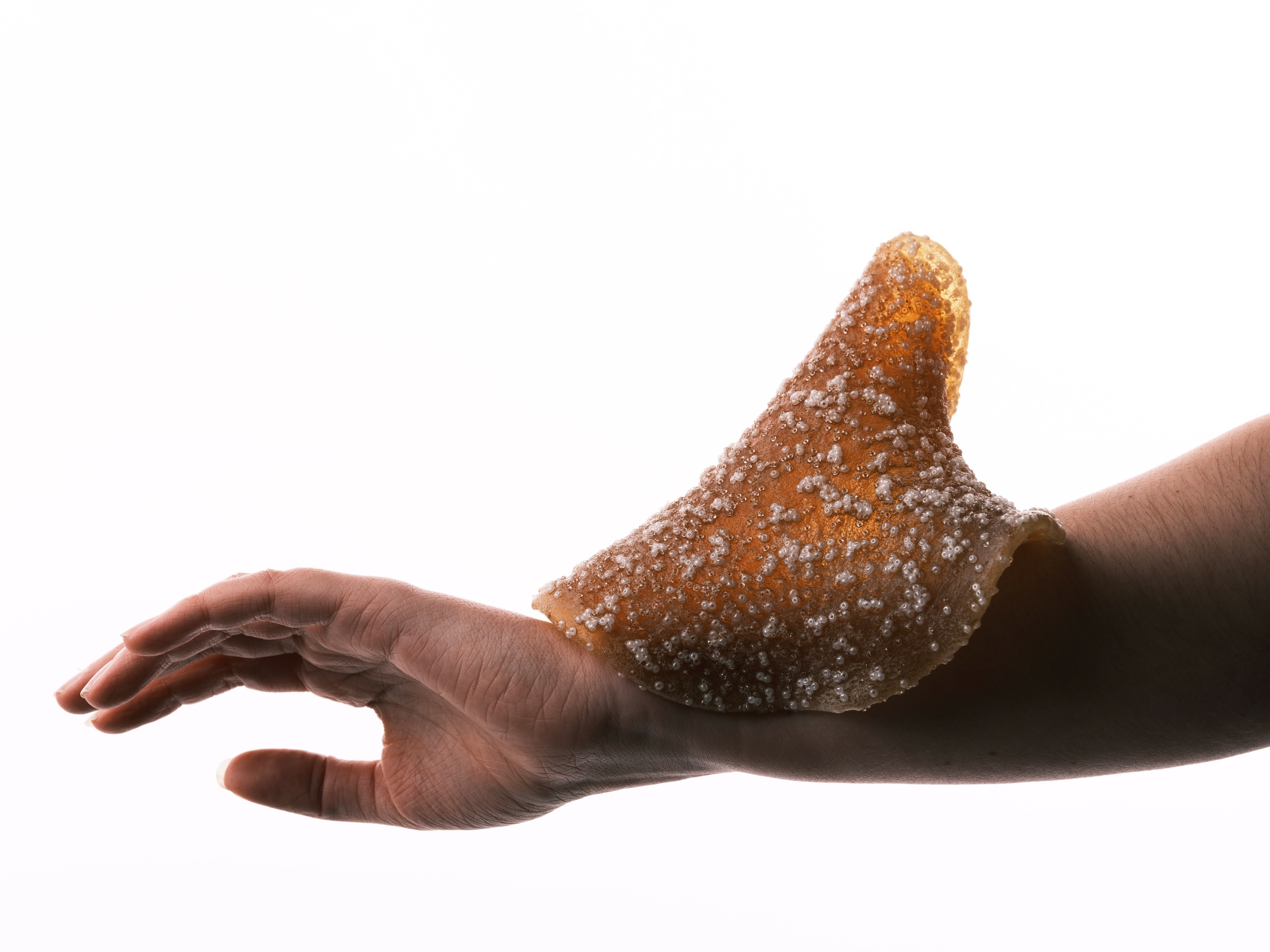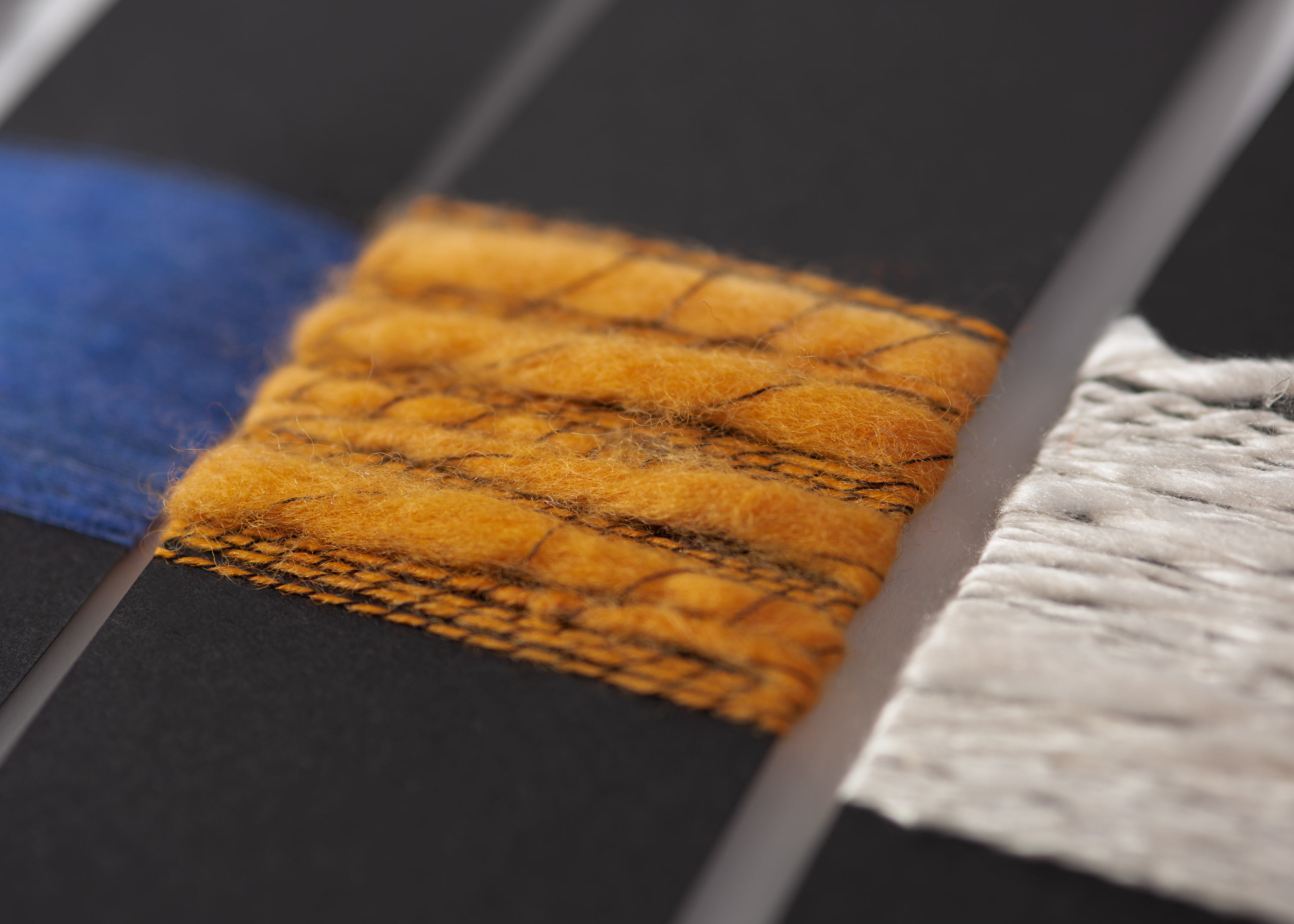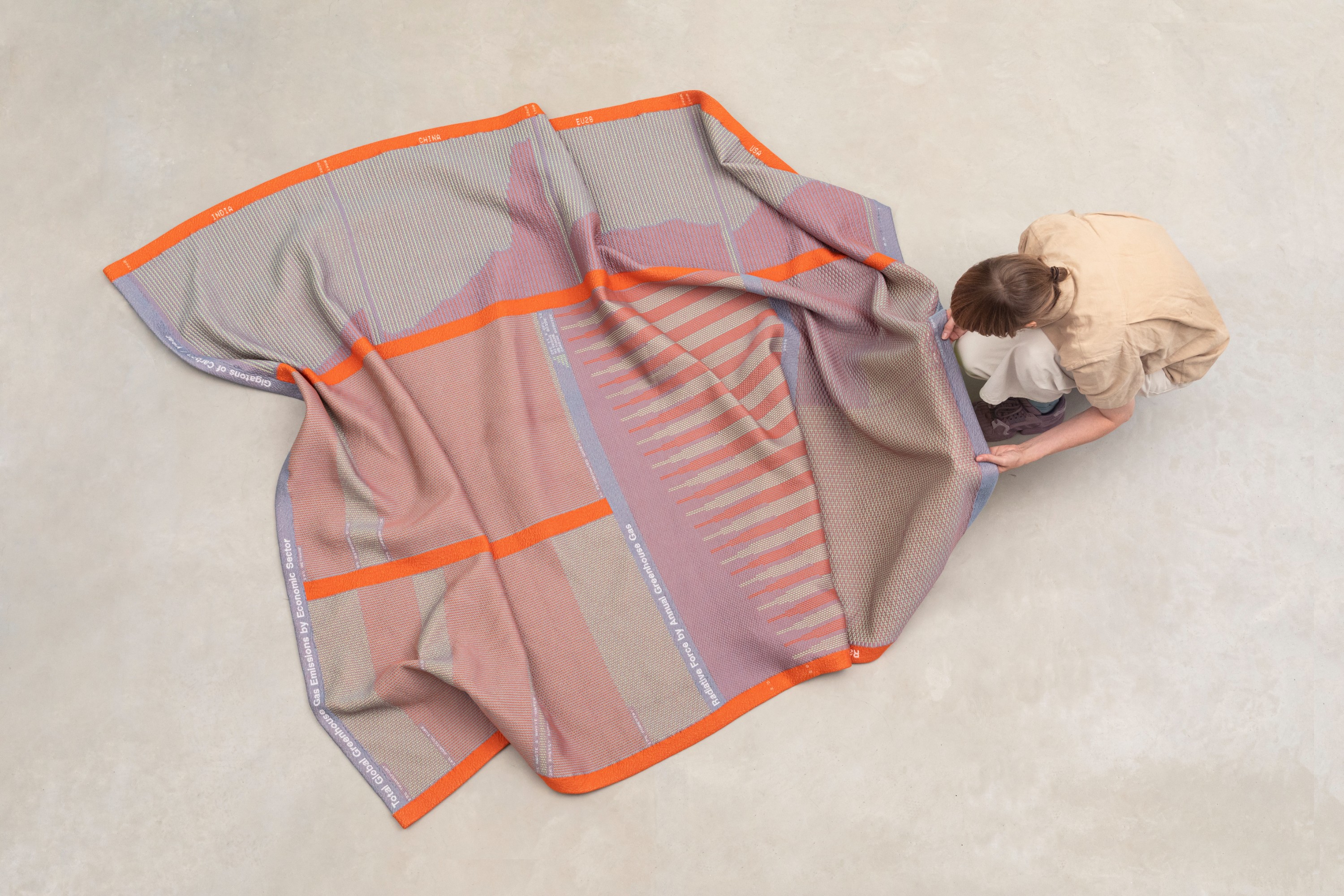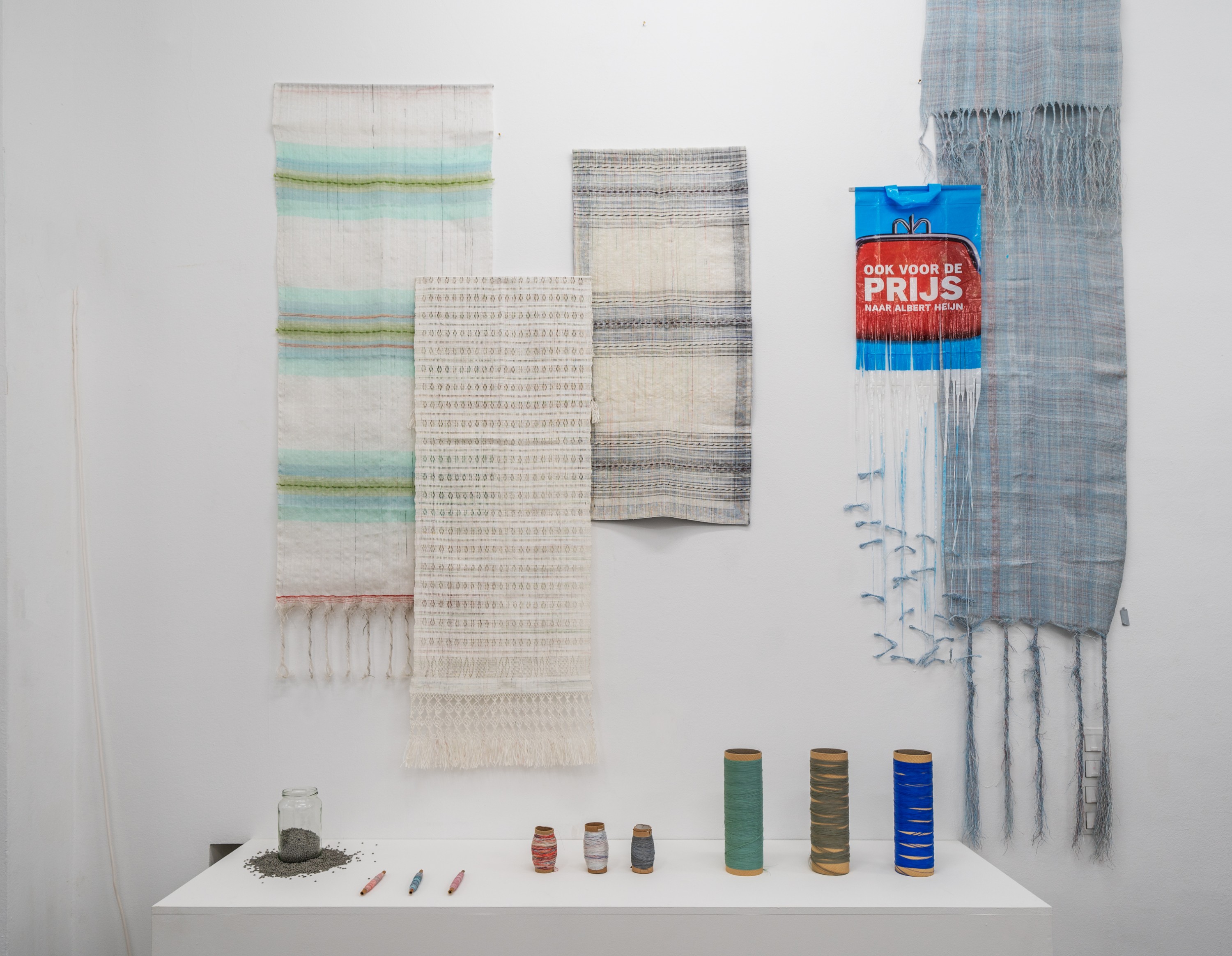Future Fabrics - Innovations in Textile Design
New materials, innovative production processes, smart technologies: Current developments in textile design offer a preview of what will stimulate and shape our society and all industrial sectors in the coming decades. After all, textiles not only play an important role in the world of fashion, they are also raw materials in many other areas.
From July 1 to 10, we will be addressing the special relevance of textile design with Future Materials - Innovations in Textile Design. In an exhibition, lectures and workshops we invite you to get in touch with the future. Tickets
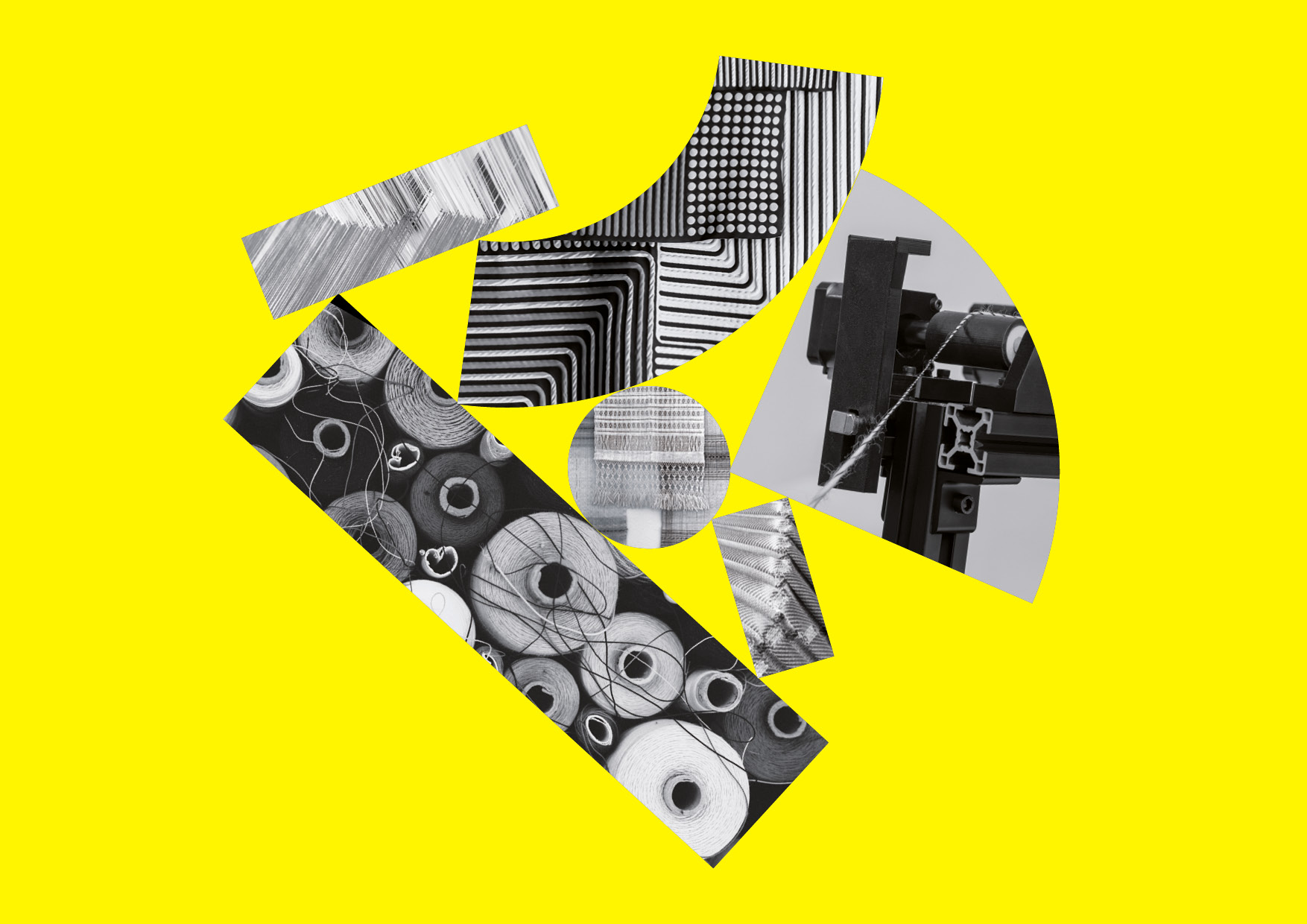
Future Materials - Innovations in Textile Design shows the broad spectrum and diverse potentials of textile design in the field of tension between digitalization, sustainability and production on the basis of projects by designers from the Netherlands, Berlin and Hamburg. From fiber to yarn, from yarn to fabric, from textile to code. We provide insights into the basics of textile design, the most diverse types of fabrics and present new developments from materials research. Whether yarns made from plastic bags, leather made from algae and palm leaves, novel form building techniques, a digital open source spinning machine or smart textiles - in many innovative application examples we demonstrate the pioneering role of textile design.
Exhibition
In addition to the different types of textiles and production techniques, the exhibition also presents new materials, recycling processes and innovative application examples. From yarn, to fabric, to textile and code, the exhibition starts at different production steps and presents forward-looking techniques and application examples. The exhibits come from Hamburg and Berlin and, together with projects from the Netherlands, provide an insight and overview into the textile design of the future.
The exhibition is open daily free of charge from 2 p.m. to 6.30 p.m. Registration or a ticket is not necessary.
Lectures & Workshops
In the lectures and workshops, designers from the Netherlands, Berlin and Hamburg will give an exclusive insight into their work processes. The focus will be on best practice examples for novel applications of textiles and processing techniques, which can also open up new perspectives for other design fields such as architecture and material sciences. The events are aimed at designers and professionals from the fields of materials research, fashion, textile and product design. For participation in workshops or lectures we ask for registration. Tickets
Timetable
Friday, July 1: Opening Textile Week with lectures
↓Opening and lectures
6 p.m.: We open the Textile Week together with the designers.
7 p.m.: Dutch designers Michelle Baggerman (Design Researcher, BureauBaggerman) and Tjeerd Veenhoven (Designer & CEO Studio Tjeerd Veenhoven) talk about sustainable textile production and innovations in bio-based material development and give deeper insights into their projects and working methods. Lecture language: English.
Saturday 2 & Sunday 3 July
↓The exhibition is open daily free of charge from 2 p.m. to 6.30 p.m. Registration or a ticket is not necessary.
Monday, July 4: About yarn and fabric
↓Workshop: An introduction to spinning with the open source "HILO E-Spinning with Sara Diaz and Natalija Krasnoperova from Studio HILO
12 p.m. - 2.30 p.m., Cost 30 EUR, Number of participants: max. 12, Registration
In the workshop, participants will learn how to create yarn from fibers. The open source HILO E-Spinning Wheel, an electric spinning wheel, is the perfect tool to start spinning and experimenting with yarn. After an introduction to spinning techniques and materials, participants will be able to get hands-on and develop their own yarn cards to take home. We will approach spinning as a technique across disciplines and see what applications it offers for textile prototyping. Innovation at your fingertips! Workshop language: German.
Presentations: 7 p.m. - 8 p.m.
with networking afterwards, Free registration
1 Sara Diaz Rodriguez & Natalija Krasnoperova (Studio Hilo): Prototyping Innovation: on the future of textile technologies and why they are open source.
The founders of Studio HILO, the Berlin-based textile innovation studio, talk about how to rethink and open source innovation in the textile industry. In 2018, Studio HILO developed the first open source spinning machine that can spin almost any material into yarn. Lecture language: German.
2. Christine Krüger: Knitted products, without waste like from the 3D printer.
Christine Krüger explains how seamless knitted products are produced by highly complex industrial knitting machines in textile production. The fashion designer and lecturer explains how the machines are fully automated and computer-controlled to produce three-dimensional knitted fabrics with maximum precision. In the lecture, Christine Krüger explains how this technology is constantly being further developed and research is being carried out into other possible applications that are more reminiscent of 3-D printing than conventional textile production. Lecture language: German.
Tuesday, July 5: Textiles with functions
↓Workshop: Wearable Light - How does it feel to wear light on your body? with Barbro Scholz
2 p.m. - 5 p.m., Cost 30 EUR Number of participants: max. 12, Registration
This workshop explores new forms of interaction with light and textiles on the body and in space. Light will be included in the design of textiles from a material science perspective. The workshop is aimed at designers and researchers from the fields of human computer interaction, textiles and performance. Workshop language: German.
Lectures: 7 p.m. - 8 p.m.
followed by networking, Free registration
1. Barbro Scholz (Designbüro Stühmer l Scholz): E-textiles Design Research
In her lecture, Barbro Scholz will report on her research projects in the field of E-textiles, which deal with the relationship between textiles and integrated technology. The human-machine relationship is critically examined, and the application of E-textiles in areas such as sustainability and VR is explored. Lecture language: German.
2 Sabine Gärtner, Markus Oberthür, Carsten Westarp (HAW Hamburg): Sound absorbing textiles.
Textiles are known to have a positive impact on room acoustics. But how must a sound-absorbing fabric be constructed in order to specifically improve acoustics? And how can the requirements found be combined with design concepts so that such textiles also meet aesthetic criteria? Sabine, Markus and Carsten talk about the contents of the interdisciplinary research project "Sound absorbing fabrics". Lecture language: German.
Wednesday, July 6: Textiles in a new context
↓Lectures: 7 p.m. - 8 p.m.
followed by networking, Free registration
1. Daniera ter Haar & Christoph Brach (RAW COLOR): Communication and Education through Textile Design
In their lecture, Christoph and Daniera, founders of RAW COLOR, join us live from Eindhoven. The designers talk about their project "Temperature Textiles". It is about communication about climate change through textiles. The knitted blankets, scarves and socks they designed communicate complex information and climate data directly through the skin into the minds of the users, while at the same time providing warmth. Lecture language: English.
2. Anna Resei: The Telenomadic Accommodation Unit, a Utopia turned Textile
Anna talks about how new collective mentalities need to be found, where the "new" is exchanged for the durable, the inflexible for the flexible, the static for the mobile, the broken for the repaired. Using her "Telenomadic Accommodation Unit" as an example, she offers insights into her speculative work promoting a more elastic approach to life. She explores changing ways of living, working and traveling for future generations in the city of the future. Lecture language: German.
Thursday, July 7: From fabric to code
↓Workshop: Knitting is Coding with Sarah Bürger
7 p.m. - 8 p.m, Cost 30 EUR, Number of participants: max. 12, Registration
In this workshop we will explore the possibilities of a hacked knitting machine and dive into the world of magical patterns. During the 1.5 hour session you will have the opportunity to get into digital knitting and make patterns from predefined motifs. At the exhibition you will also be able to prepare your own files for further processing. More details will be announced during the exhibition.
The workshop is open to anyone with previous knowledge of (machine) knitting at beginner level with textile experience. Workshop language: German.
Lectures: 7 p.m. - 8 p.m.
followed by networking, Free registration
1.Sabine Gärtner: The Jacquard loom, the prehistory of coding
The principle of Jacquard weaving is based on binary programming. Sabine Gärtner illustrates this technology with historical examples. She presents the first Jacquard machine with punched card programming from 1805 and builds a bridge to the digital prototyping loom in the present. Lecture language: German.
2. Sarah Bürger: On digital co-creation and natural intelligence.
Sarah talks about the new materialism, digital co-creation, and natural intelligence. As a board member of Fab City HH e.V., she supports the city's goal of becoming a circular city in the textile sector. She is also a consortium partner for the Open Lab Circular Textiles Hamburg. The lab will open its doors in mid-June and conduct research in the field of decentralized manufacturing of textiles and clothing to achieve the ambitious goal of becoming a Fab City by 2054. Lecture language: German.
Friday, July 8: Textile innovations
↓Workshop: Activation of flexible elements by means of pneumatics with Esther Holsten-Stühmer
2 p.m. - 5 p.m., Cost 30 EUR, Number of participants: max. 12, Registration
The connection between the soft and the hard world always confronts us with tasks in textile designs that cannot be solved from the textile alone. In the workshop we will address this threshold with the help of pneumatics. We develop structures from paper and textile and observe what happens when we create a vacuum around them or fill their environment with air. We will discuss forms of documentation and structures to further develop experimental results and try to create specific conditions. Workshop language: German.
Lectures: 7 p.m. - 8 p.m.
followed by networking, Free registration
1. Bea Brücker: On the fusion of biodesign and new technologies
In this talk, Bea will talk about her work, exploring how the combination of biodesign practices and new manufacturing technologies can be used for an economically and socially liberating design practice. Working at the intersection of design and art, new technologies, living organisms, and computational design, she is developing a compostable algae material and digital design tools and fabrication systems for working with biomaterials. Lecture language: German.
2. Esther Holsten-Stühmer: The industrialization of innovation.
Why does one idea remain just an experiment and another go into production? Esther talks about the prerequisites and development steps that make the industrialization of innovations possible. Lecture language: German.
Programmthemen
Biobasierte Materialien
↓Freitag, 1.7., 19 Uhr im Rahmen des Openings: Michelle Baggerman & Tjeerd Veenhoven
Freitag, 8.7., 19 Uhr: Bea Brücker: Über die Verschmelzung von Biodesign und neuen Technologien
Open-Source & Maschinen
↓Workshop am Montag, 4.7. von 12.00-14.30 Uhr: Eine Einführung ins Spinnen mit dem Open Source „HILO E-Spinning Wheel“
Vortrag am Montag, 4.7. um 19 Uhr: Studio HILO: Prototyping Innovation - Über die Zukunft von Textiltechnologien und warum sie Open Source sind
Workshop am Donnerstag, 7.7. von 14.00-16.00 Uhr: Sarah Bürger: Stricken ist Coding
Vortrag am Donnerstag, 7.7. um 19 Uhr: Sarah Bürger: Über digitale Co-Kreation und natürliche Intelligenz
Kommunikation durch Textilien
↓Vortrag am Mittwoch, 6.7. um 19 Uhr von:
Daniera ter Haar & Christoph Brach (RAW COLOR): Kommunikation und Bildung durch Textildesign, Vortragssprache englisch.
Anna Resei: The Tele-Normadic Shelter Unit. Eine Textil gewordene Utopie
Neue Verarbeitungstechniken
↓Ausstellung 1.-10.7., täglich 14-18:30: U. a. mit Studio Schirm & Strauch und ihrer Arbeit über ein experimentelles Textilarchiv
Vortrag am Montag, 4.7., 19 Uhr: Christine Krüger Strickprodukte ohne Verschnitt wie aus dem 3D-Drucker
Vortrag am Dienstag, 5.7., 19 Uhr: Sabine Gärtner, Markus Oberthür, Carsten Westarp (HAW Hamburg): Schallabsorbierende Textilien
Innovative Anwendungen
↓Workshop am Dienstag, 5.7. von 14-17.00 Uhr: Barbro Scholz: "Wearable Light - Wie fühlt es sich an, Licht am Körper zu tragen?"
Workshop am Freitag, 8.7. von 14-17.00 Uhr: Esther Holsten-Stühmer: Aktivierung biegeschlaffer Elemente mittels Pneumatik
Vortrag am Donnerstag, 7.7. um 19 Uhr: Sabine Gärtner (HAW Hamburg): Der Jacquardwebstuhl, die Urgeschichte des Codings
Vortrag am Freitag, 8.7. um 19 Uhr: Esther Holsten-Stühmer: Die Industrialisierung von Innovation
Participants
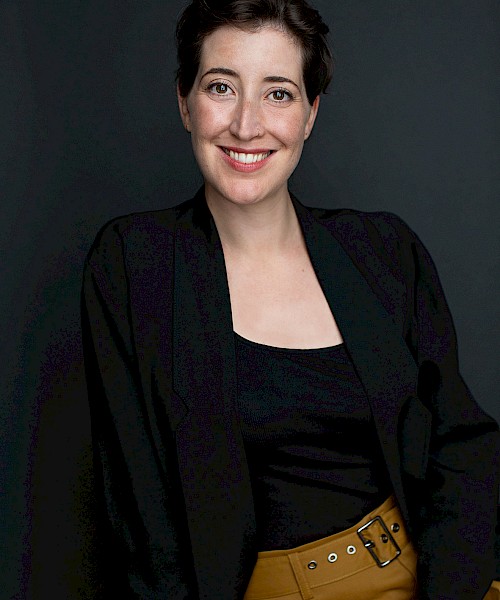
Michelle Baggerman, Groningen, NL
Design Reseacher
To understand the role of design in this time of climate crisis,Michelle Baggerman turns to the past. She explores the impact and cost of technological development and how archaic forms of textile production can provide more than aesthetic inspiration for design. In this way, she discovers an inherent sustainability in craft practices. She finds intelligent ways to link this craft sustainability with modern materials and technologies, encouraging tradition and innovation to reinforce rather than replace each other.
Website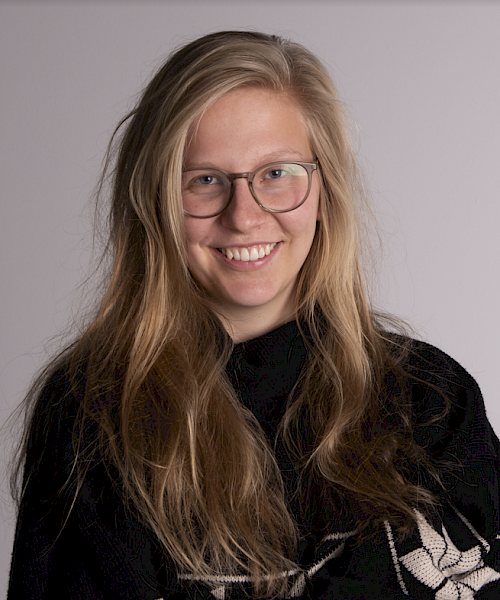
Rebekka Jochem, Eindhoven, NL
Designer
Rebekka Jochem began to explore the connections between textile work and programming during her diploma thesis at the University of Wismar. In her work with electronics and textiles, the Cologne native brings together the two fields, which are historically closely connected but belong to different worlds in terms of social perception and appreciation. Currently living in the Netherlands, Rebekka continues to develop this way of working in her master's thesis at the Design Academy Eindhoven.
Website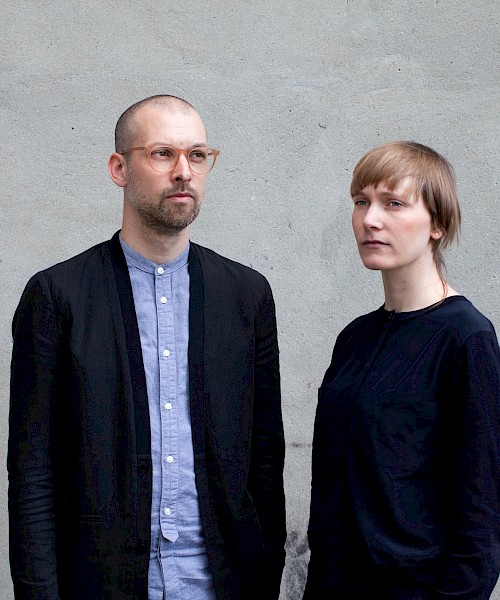
Raw Color, Eindhoven, NL
Graphic Design, Photography and Product Design
Raw Color was founded by designers Christoph Brach and Daniera ter Haar. The studio has a unique understanding of the use of color in design. It works across disciplines, combining graphic design, photography and product design. Christoph Brach and Daniera ter Haar help companies develop the tools they need to position themselves for the near and distant future. The studio's work reflects a sophisticated approach to materials, embodied in research and experimentation to build a visual language.
Website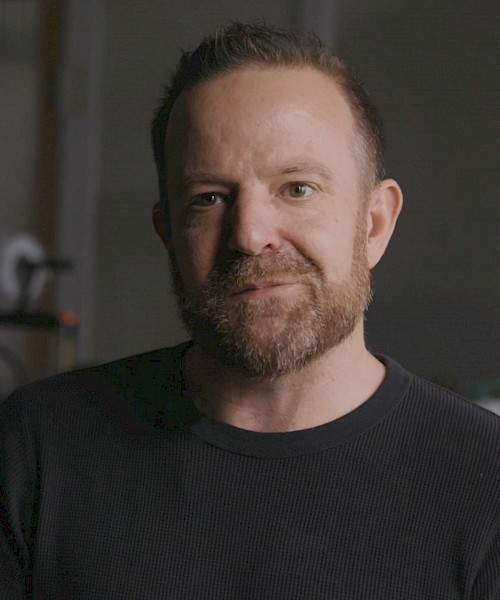
Tjeerd Veenhoven, Groningen, NL
product design studio
Studio Tjeerd Veenhoven (STV) develops and designs sustainable materials and products. STV has many years of experience in upgrading organic residual streams for applications in various sectors such as interior design, apparel and construction. The studio develops innovative biopolymers or uses biobased polymers from partner companies. Through self-initiated and commissioned projects, STV has acquired extensive knowledge of cellulose, chitin, starch and mycelium. Over the past 20 years, STV has worked with leading brands to enable more sustainable consumption. Their projects such as Palmleather and AlgaeFabrics have been recognized for their quality over the years.
Website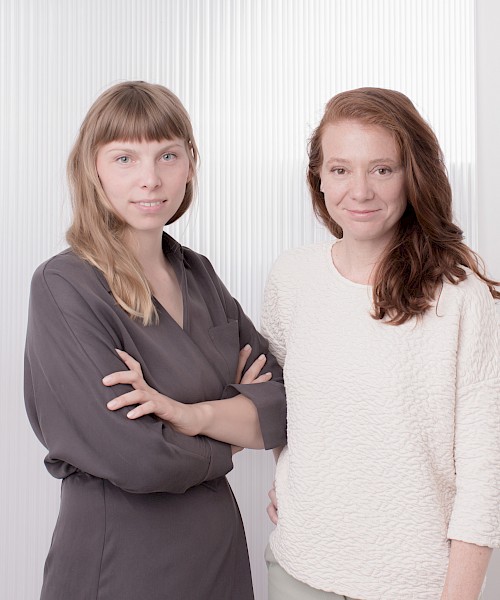
Studio HILO, Berlin
Studio for textile innovation
"We are rethinking the textile industry by providing open tools and expertise for small textile production environments." HILO's mission is to create playgrounds for independent yarn production. The studio was founded in 2018 by Sara Diaz Rodriguez and Natalija Krasnoperova and has grown into a larger team of interdisciplinary experts* in textile technologies. The team combines expertise in design, research, pedagogy, coaching, entrepreneurship, engineering and technology.
Website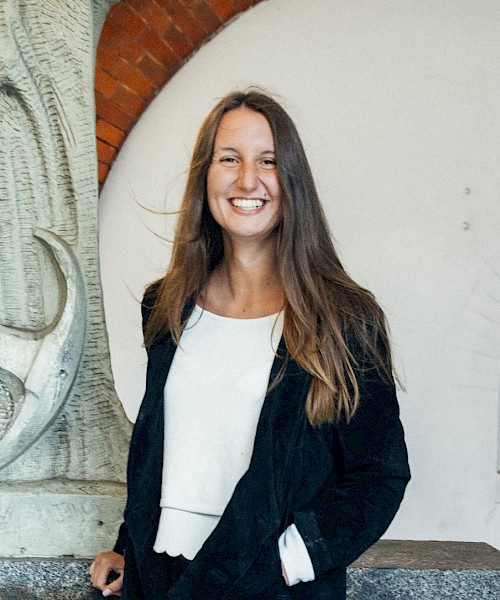
Bea Brücker, Hamburg
Designer & Artist
Bea Brücker is an interdisciplinary designer and artist whose focus is on the fusion of biodesign and new technologies. Since January 2022, she has been a visiting lecturer at the Royal College of Art in London, where she teaches the fashion master's biodesign platform. Her work explores how the combination of biodesign practices and new manufacturing technologies can be harnessed for an economically and socially liberating design practice. Working at the intersection of design and art, new technologies, living organisms, and computational design, she is developing a compostable algae material, as well as digital design tools and fabrication systems for working with biomaterials.
Website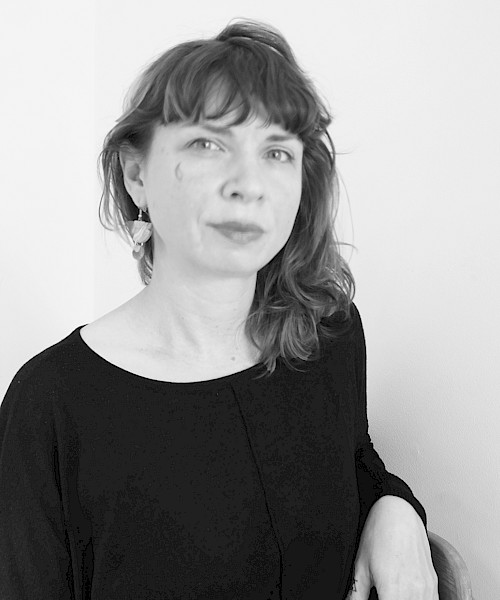
Sarah Bürger, Hamburg
Designer & Founder, House of All
Sarah Bürger aims to change the fashion world. She is particularly interested in the areas of new materialism, digital co-creation and natural intelligence. As a board member of Fab City HH e.V., she supports the city's goal of becoming a circular city in the textile sector. She is a consortium partner for the Open Lab Circular Textiles Hamburg. The lab will open its doors in mid-June and conduct research in the field of decentralized manufacturing of textiles and clothing to achieve the ambitious goal of transforming Hamburg into a Fab City by 2054.
Website
Christine Krüger, Hamburg
Fashion designer
Christine Krüger has been working with all facets of knitwear design for over 20 years. In her designs for various companies and in her own award-winning projects, as well as a university lecturer at HAW and AMD, she constantly reinterprets these complex techniques. In doing so, she is passionate about both the craft side of knitting and state-of-the-art industrial knitting machines. She is convinced that innovative design can only come from professional know-how.
Website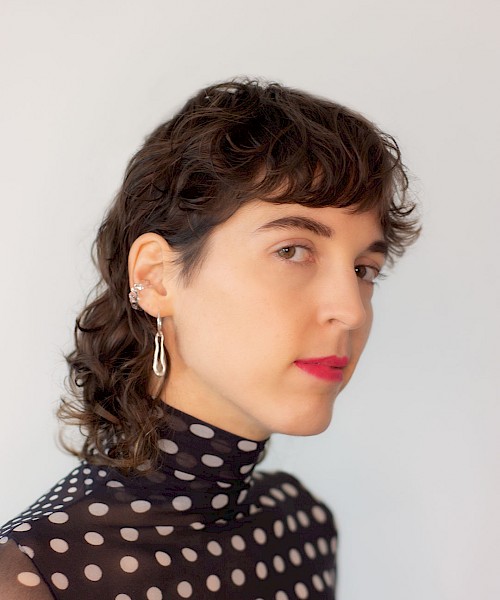
Anna Resei, Hamburg
Conceptual Designer
Anna Resei's focus is on narrative design and material research. In her work she tries to overcome existing boundaries between existing design fields. She is interested in creating functional and abstract objects that can be experienced in both physical and digital space. Textiles play a central role in her work: as material as well as idea, metaphor and technique.
Website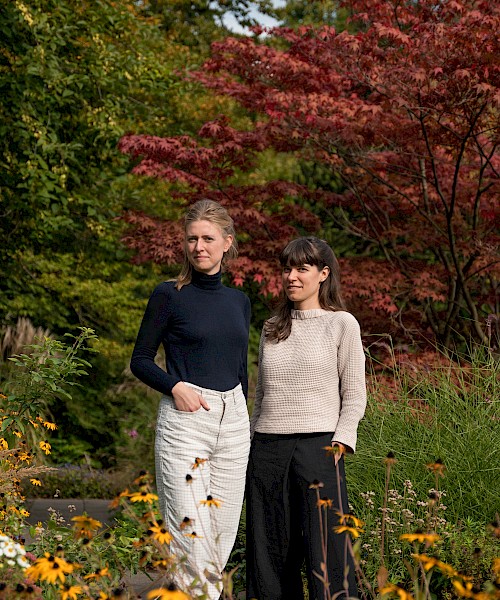
Schirm & Strauch, Hamburg
Textile design
Linda Schirmel and Nicole Kiersz are dedicate their work to traditional crafts and the processes involved. Since summer 2020 this is done under the name Studio Schirm & Strauch. In their first research-based project, they collaborate with Studio HILO and the open-source spinning machine. They weave and knit the home-spun yarn from regional sheep and alpaca fibers into their first experimental textile archive. Storytelling and textile knowledge through photography and film is another component of the duo's work. The project is supported by the Claussen-Simon-Foundation Hamburg.
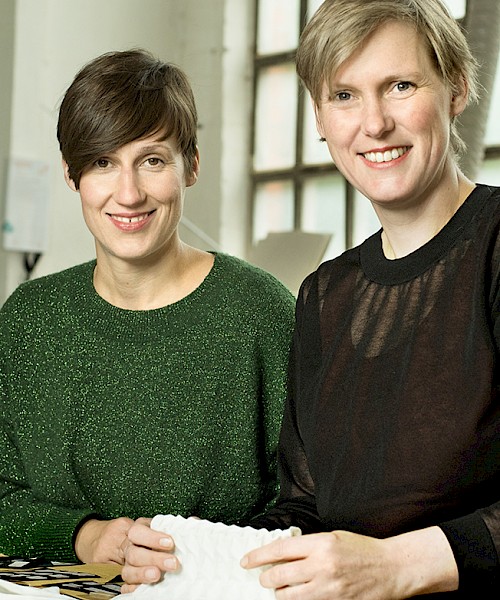
Stühmer | Scholz, Hamburg
design research & product development
Stühmer|Scholz Design_büro specializes in the design of textile technology and smart products. It was founded in 2012 by Barbro Scholz and Esther Holsten-Stühmer. Since then, they have been working in design research and product development, accompanying textile products without predecessors into series production. Among other things, they have been awarded as Creative Pilots of the Federal Republic of Germany, with the EU-wide innovation funding programs "WearSustain" under Horizon 2020 and the "Worth Project".
Website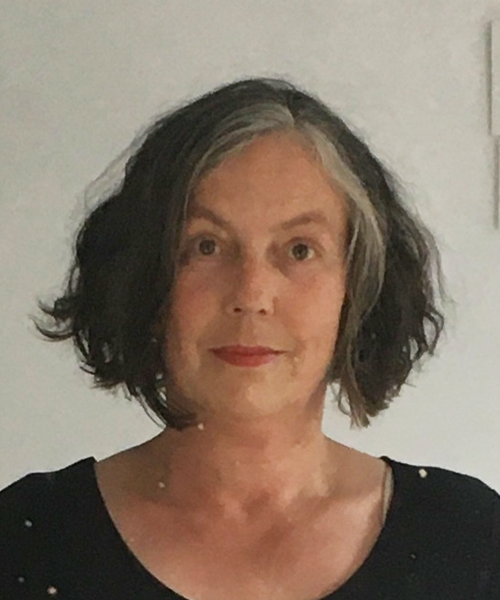
Sabine Gärtner, Hamburg
Textile design & Weaver
Sabine Gärtner researches and teaches as a research associate in the Weaving Laboratory at HAW Hamburg. Her professional focus for many years has been the development and analysis of complex fabric constructions, based on a wide variety of technologies, materials and application references. Here she pursues a research approach in which technical, aesthetic, functional and haptic components of a fabric are determined in their interaction. Since the implementation of the digital prototyping Jacquard pattern loom, the laboratory she supervises provides optimal conditions for research and teaching and is thus state of the art.
Website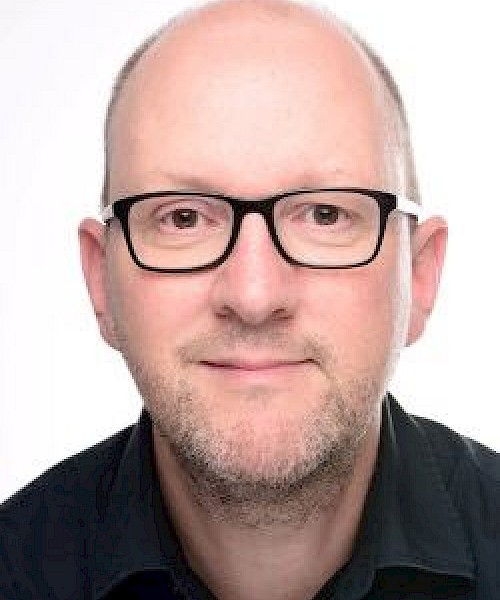
Prof. Markus Oberthür, Hamburg
Professor of Textile Chemistry
Prof. Markus Oberthür (Dr. Ing.) holds a doctorate in chemistry and represents the field of textile chemistry in the clothing technology (BTM) course at HAW Hamburg. His interests include dyeing, textile finishing, fiber analysis and new materials. In addition, he is critically concerned with the effects of the textile and fashion industry on people and the environment.
Website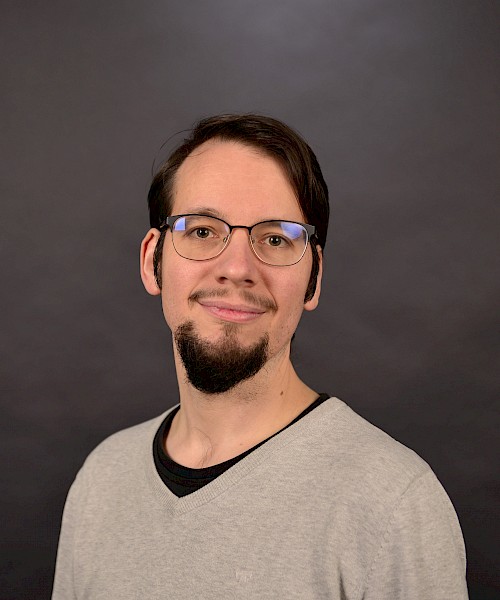
Prof. Dr. Carsten Westarp, Hamburg
Wissenschaftlicher Mitarbeiter im Physiklabor, HAW Hamburg
Originally coming from semiconductor research and sales, Carsten Westarp's (Dipl. Physics) current activities are focused on quality assurance of teaching. The focus here is on competence-oriented teaching with the aspects of learning space design, problem-based learning, hybrid learning such as inverted classroom as well as cooperative and interdisciplinary learning. Part of the teaching is also tying in with his research activities in the areas of SmartGrid and acoustic fabrics.
WebsitePartner
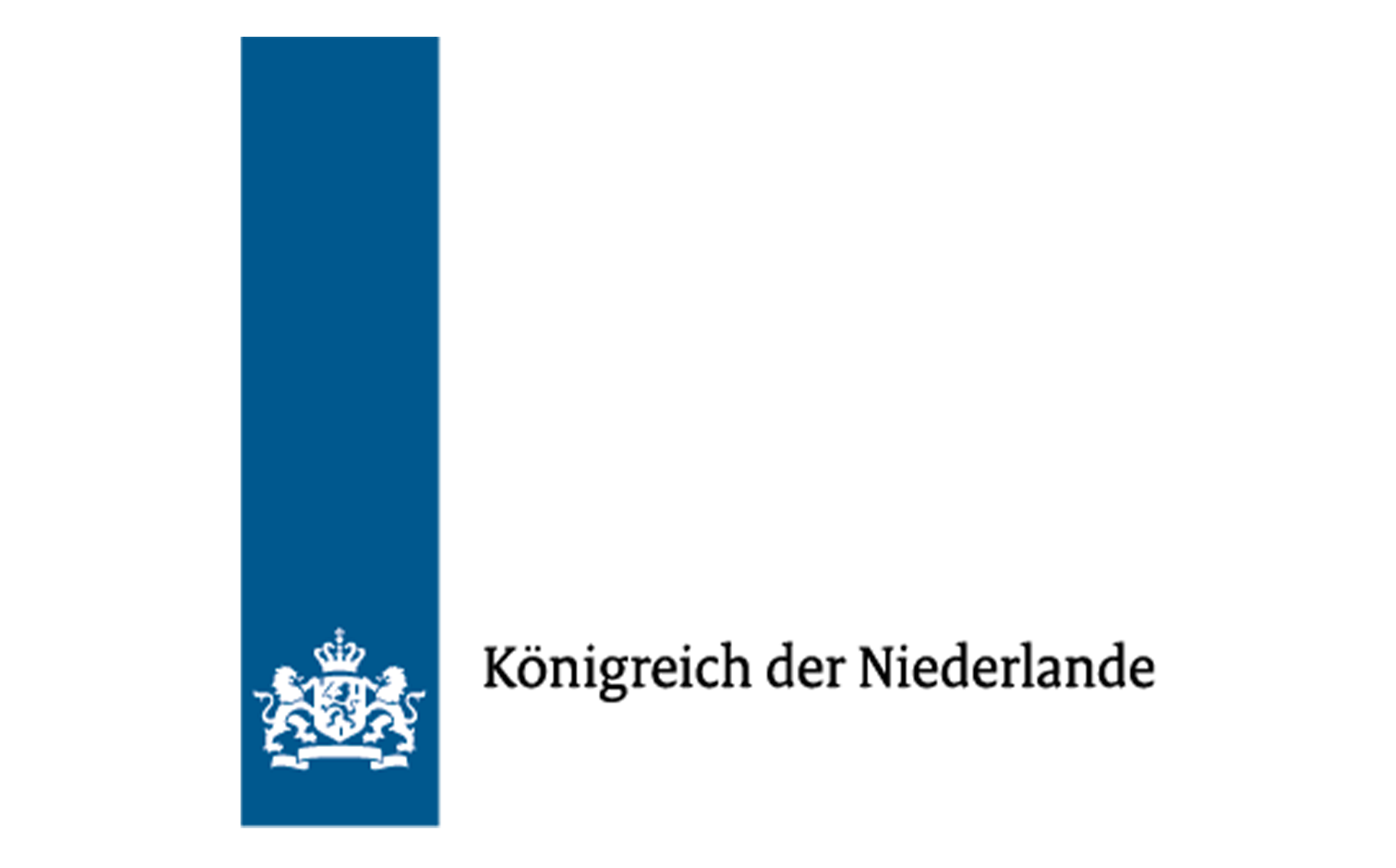
Contact
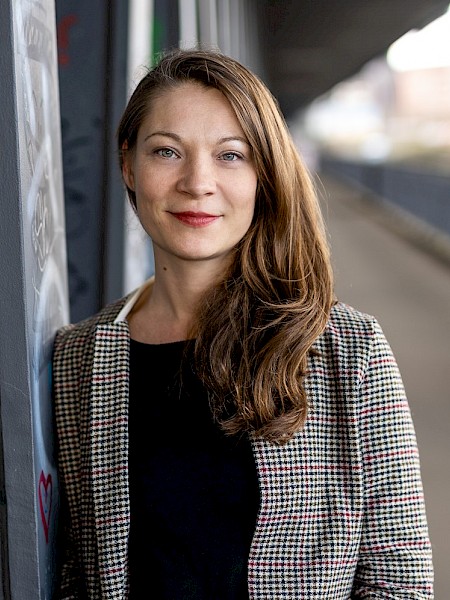
Annika Fitz oversees events, is responsible for talent development and building interdisciplinary networks in the areas of young talent, innovation, sustainability and transformation. She studied Industrial Design at the HFBK Hamburg. Her design spectrum ranges from product and interior design for agencies to process design.
